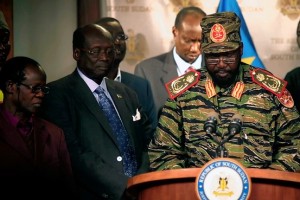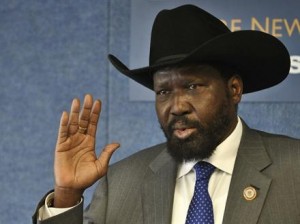President Blames Forces Loyal to His Former Ally
London (WSJ) – The president of South Sudan said his guards fended off renegade soldiers who were attempting to overthrow the government, a clash that exposes the oil-rich nation’s fragmented and fragile political situation.
Dressed in military fatigues, President Salva Kiir told reporters in the capital city of Juba on Monday that his forces were in control following a night of fighting with soldiers from an army faction loyal to former Vice President Riek Machar.
“Justice will prevail and those attackers are being pursued,” Mr. Kiir said. “This was an attempted coup but it failed.”
The president declared a dusk-to-dawn curfew in Juba, while thousands of civilians sought shelter at United Nations bases in the city. More than 100 wounded were being treated at a Juba hospital, U.N. radio said.
Messrs. Kiir and Machar were once allied rebel leaders but rifts between them have deepened since South Sudan gained independence from Sudan in 2011. Mr. Kiir fired Mr. Machar as vice president in July, one of many apparent moves by the president to consolidate power.
Some analysts said the violence may not have been an actual coup attempt but rather infighting between their respective military factions that got out of hand.
“It doesn’t seem to be a full-fledged coup attempt in the sense that there’s an organized attempt by Machar to seize power. It appears a bit disorganized,” said Magdi el Gizouli, an analyst with Kenya’s Rift Valley Institute, based in Germany.
President Kiir said the first shots were fired about 6:30 p.m. on Sunday by a single gunman, followed by a larger attack from soldiers allied with Mr. Machar.

President Salva Kiir, in military uniform, said his forces were in control after a night of shooting in the capital.Reuters
Juba residents reported shooting and mortar fire well into Monday morning. By the evening the situation appeared calmer, but sporadic gunfire could still be heard and the military remained heavily deployed.
International airlines cancelled flights into the city; Kenya Airways said the airport had been closed. Mobile phones in South Sudan were working only erratically.
Some 13,000 civilians had sought shelter inside the U.N. bases in Juba by Monday evening, said Toby Lanzer, U.N. deputy special representative in South Sudan. The U.N. and U.S. called for calm.
U.N. staff in Juba were on lockdown from Sunday night. The U.N. Mission to South Sudan was established by the Security Council after the country’s independence to help consolidate peace and security. It has two large bases and several smaller compounds in Juba.
An international contractor, speaking anonymously because the individual wasn’t authorized to speak to the media, said international organizations in Juba were looking at evacuation routes in case the fighting continued.
Messrs. Kiir and Machar were key figures in the ranks of the rebel South Sudan People’s Liberation Movement, which fought a two-decade civil war against the Sudanese government in Khartoum.
But the two figures have been at odds since South Sudan became independent, and the tension between them has threatened to upend the stability of the world’s youngest nation.
After dismissing Mr. Machar, Mr. Kiir also purged his cabinet. Among those fired was Pagan Amum, the country’s former chief oil negotiator with Sudan.
Last week Messrs. Machar and Amum announced that they had pulled out of planned talks to heal rifts within the ruling party, accusing the government of “deviating from the spirit of dialogue.”
“What it may have been was a reflection of the internal turmoil within the party,” said Cedric Barnes, an analyst with International Crisis Group in Nairobi. “An internal military quarrel may have spilled over into the wider arena of Juba.”
Messrs. Machar and Amum couldn’t immediately be reached for comment.
Mr. Gizouli said the clashes could lead to others.
“I can imagine all sorts of militia formations in the South Sudanese countryside thinking very hard…’Is it easier now to take up arms against the state?’,” he said. “This is very encouraging to challengers to authority in Juba.”
South Sudan has repeatedly clashed with its neighbour, Sudan, over oil production and exports. While South Sudan has much of the oil, it must be transported for export through pipelines that stretch across Sudan.
South Sudan has sub-Saharan Africa’s third-largest oil reserves, after Nigeria and Angola.



